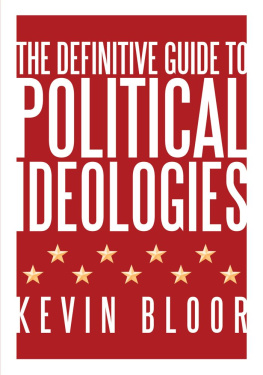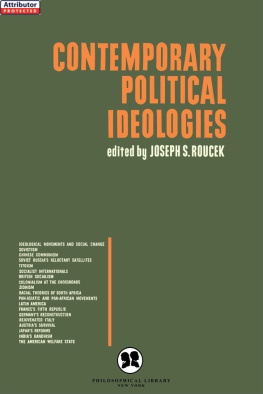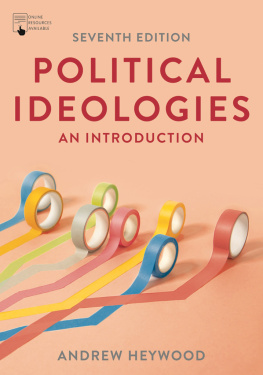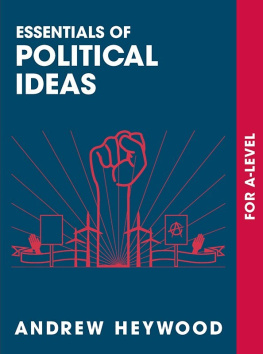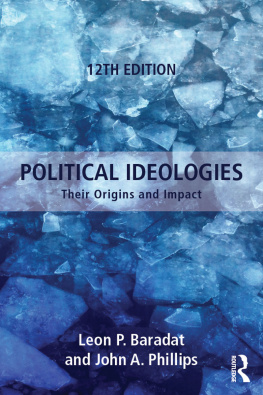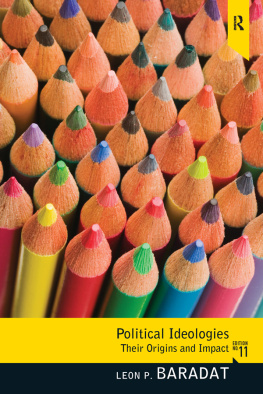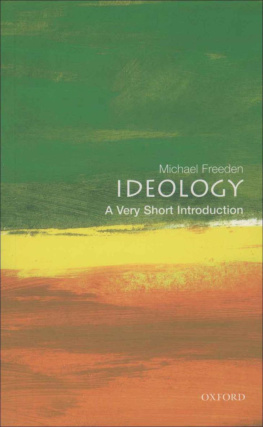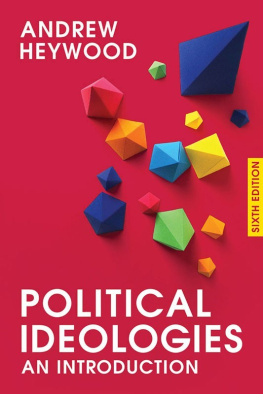The Definitive Guide
to Political Ideologies
Kevin Bloor

AuthorHouse UK Ltd.
500 Avebury Boulevard
Central Milton Keynes, MK9 2BE
www.authorhouse.co.uk
Phone: 08001974150
2010 Kevin Bloor . All rights reserved.
No part of this book may be reproduced, stored in a retrieval system, or transmitted by any means without the written permission of the author.
First published by AuthorHouse 2/4/2010
ISBN: 978-1-4490-6761-8 (sc)
ISBN: 978-1-4670-2392-4 (e)
This book is printed on acid-free paper.
Contents
To all my former students at Freemens, this book is for you.
What is ideology?
Why does political ideology matter?
Try as you might, you cannot escape politics. It has you in its grip from the minute you are conceived to the moment you shuffle off this mortal coil. Virtually all aspects of our behaviour are influenced even governed by the parameters of politics. There is surely nothing within the realm of human understanding more all-pervasive than politics. Therefore, it must logically follow that the inquisitive amongst us should cultivate our understanding of politics in order to better understand ourselves and the world that surrounds us.
Political ideas determine the course of human history. They reflect the very best of human nature and the very worst that humanity is capable of. Political ideas can be an overwhelming force for good, or the basis for almost unimaginable destruction. Hope and fear are always present at the table of political ideas - very often in the same ideology. Take the concept of freedom as an example. Virtually all of us lead more hopeful and fulfilling lives due to the march of freedom. However, the concept of freedom has been used to justify terrible atrocities throughout the ages. In the immortal words of one of the many nameless victims of the Robespierre-led terror following the French Revolution; Freedom how many crimes have been committed in your name! A similar observation could be made about a myriad of other political concepts and ideas ranging from equality to national unity.
The origins and importance of the term ideology
The term ideology derives from the French theorist Antoine Destutt de Tracy (1754-1836) around the time of the aforementioned revolution of 1789. He saw the need for a scientific approach to the human understanding of ideas in a manner akin to the methods employed in the natural sciences. He believed that such an approach would form the basis for a rational society. It seems particularly appropriate to begin with a scholar from the Enlightenment because political ideology itself owes so much to that important historical epoch, and that the French revolution was driven by radical political ideas.
Ideology has an impact in a multiplicity of ways. At its most direct, ideology provides the basis for a conflict that impacts upon millions of lives. On a more everyday level, ideology can offer a sense of identity and a connection to others. Political ideology can therefore help to identify and define us, but it can also restrict us too. The attitude of others towards a particular ideology can sometimes be hostile. In the context of the various agents of the state, a persons ideological beliefs can quite literally carry a prison sentence (even a death sentence in some cases). For others, an adherence to an ideology is merely a passing affectation particularly during their student years. During the life course our commitment to an ideology may fluctuate and even dissipate altogether. Nonetheless, the ideologies you will discover more about in this book have shaped the course of history and continue to influence events within the world we inhabit today. Political ideas and ideologies have shaped our past and will doubtless influence our very futures. They have been deemed worth fighting for and worth dying for; and that is what I hope makes them so interesting
The ideological spectrum
When learning about political ideologies it is often beneficial to begin with an understanding of the ideological spectrum and the notion of Weltanschauung. In the case of the former, the ideological spectrum has been portrayed in both a horizontal and vertical manner. The horizontal axis goes from left to right whereas the vertical axis is authoritarian and the top and libertarian at the bottom. Using this model helps clarify the position of various ideologies and draw some comparison and contrast between them.
The distinction between left and right along the horizontal axis is a simple one, and as with several other ideological concepts finds its origins in the French Revolution. In the French National Assembly those who opposed the status quo and favoured a radical change to society sat on the left, whereas those who supported the King and the status quo sat on the right. To this day, the term left-wing is associated with a desire to radically change the basis of society, whereas the term right-wing is routinely applied to those who favour the status quo and in some cases the status quo ante (the way things were before). Whilst there is a good deal more to the left-right distinction, it does nonetheless offer a useful start for students of political ideology.
The authoritarian and libertarian axis is also a straight-forward one to understand and centres primarily upon the role of the state. Ideologies that belong on the authoritarian side of the spectrum prescribe a strong role for government in terms of securing their objectives. This may entail equality and social justice (socialism), national unity (nationalism / fascism), social order (conservatism) or the establishment of a theocracy (religious fundamentalism). In contrast, those ideologies associated with a libertarian outlook (such as anarchism and liberalism) believe that the concentration of power into the various agents of the state is undesirable and to be avoided. In order to grasp the reasons why, one has to understand the wider perspective held by that particular ideology. For instance, liberals believe that the power of the state must be curtailed because it represents a major threat to individual liberty. The only justification for state intervention is to maximise the concept of liberty. Anarchists go one stage further and claim that the state is a source of evil and must be abolished in order for people to experience genuine freedom. Anarchism represents the most extreme form of libertarianism and is as far away from fascism (the most hard-line form of authoritarianism) as one can get.
The horseshoe model strives to address a significant flaw with the conventional left-right libertarian-authoritarian axis. Ideologies of an authoritarian nature - such as fascism and a strand of socialism known as Marxism are placed far away from each other on the left-right horizontal axis. This is because fascism is an ideology of the extreme right whereas Marxism is an ideology of the extreme left. However, this typology implies that the two ideologies are polar opposites with no common ground, yet in practise there are considerable similarities between the two in terms of the role of the state, the importance of propaganda, the lack of respect for human rights, the emphasis upon sacrifice for the greater good and the extent to which society is based upon collectivism. As such, the horseshoe model may be more appropriate in terms of our understanding of political ideologies. The horseshoe model has become much more widespread within ideological discourse in recent times. However, throughout this book the traditional left-right authoritarian-libertarian axis will be used because it still has considerable merit as a tool for learning.
The importance of Weltanschauung
Next page
